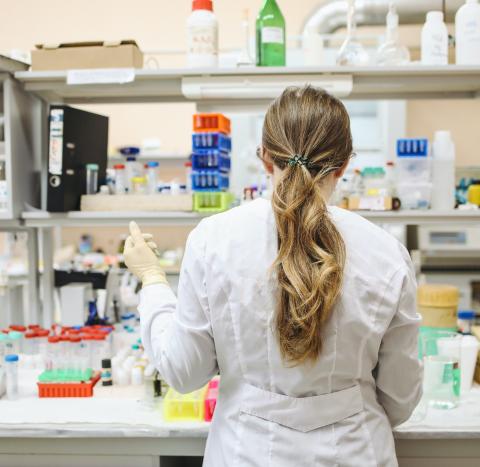High-grade serous is the most common type of ovarian cancer. Treatment options have improved in recent years thanks to medical research, but resistance to standard treatments is still a major issue. There’s a clear need to develop new and better treatments for high grade serous ovarian cancer.
A large proportion of tumours from patients with high-grade serous ovarian cancer have higher than normal levels of a protein called cyclin E1, which is involved in the control of cell growth. These high levels of cyclin E1 are thought to contribute to the growth and progression of high-grade serous ovarian cancer tumours. Importantly, the overproduction of cyclin E1 is seen in high-grade serous ovarian cancer patients who are unable to benefit from PARP inhibitors. This new project seeks to develop an innovative way of targeting cyclin E1 in these tumours, whilst not affecting the growth and development of normal cells.
Overview of the project:
It has been shown that high-grade serous ovarian cancer tumours that have high levels of cyclin E1 are dependent on a protein called PKMYT1 for their survival. The overall goal of this project is to develop a new drug that targets PKMYT1, and that tumour cells that have high levels of cyclin E1 will be particularly vulnerable to this intervention.
Most drugs work by directly inhibiting the action of a target protein. For example, aspirin works by blocking proteins that make chemicals called prostaglandins, which in turn cause swelling and pain. One challenge with this approach is that the drug doesn’t actually remove the target protein, and in cancer, some tumours just make more of the protein, thereby overwhelming the drug that is administered. An alternative method, which will be pursued in this project, is to actually destroy the target protein. The research team plan to use an innovative technology – using molecules called proteolysis targeting chimeras (PROTACs) – that trick cells into destroying specially selected proteins.
The aim of this approach is for the new drug to identify and destroy PKMYT1. Importantly, removing PKMYT1 does not kill normal, healthy cells, and therefore it is hoped that this new approach can be highly specific and effective in treating patients with high-grade serous ovarian cancer tumours with high levels of cyclin E1.
If successful, the project could lead to the development of new therapies which could transform the treatment of drug-resistant ovarian cancer.



